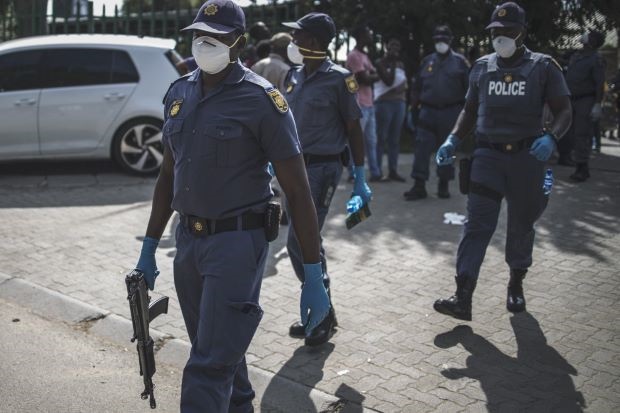
In many parts of the world that are under lockdown, the behaviour of citizens, the speed with which governments moved to ensure testing and quarantining of those who are positive, the provision of relief measures including compensation for loss of earnings to workers and companies, especially small businesses, have helped reduce infections, writes Mbhazima Shilowa.
From Friday 27 March 2020, South Africa will be on lockdown.
The drastic measures were announced by President Cyril Ramaphosa following the initial declaration of the national state of disaster.
Even at the time of the announcement of the national state of disaster there had been calls for the country to follow other countries that had declared lockdowns including the closure of ports of entry.
From the announcement by the president and the regulations that followed, it is clear that it could not be done by decree as other countries had done but had to follow the Constitution of the republic and the Disaster Management Act.
Also as is his want, the president needed to ensure that he has had wide consultations with the various stakeholders whose support is necessary for the lockdown to succeed bearing in mind its impact on the economy and on the livelihood of the majority of South Africans.
Even before the current situation, our economy had virtually ground to a halt.
It was therefore necessary for the president to work with SARS, the Reserve Bank, the business community and labour on measures that could be taken to mitigate the hardship that comes with a lockdown: loss of income by workers, street vendors, informal and formal businesses.
The announcement of a lockdown which will begin tonight at midnight, has seen many who come from rural areas or working outside of their provinces starting to trek home.
Johannesburg park station, Pretoria big station and other major centres in Gauteng were teeming with people trying to get transport before the lockdown.
While there is a call for citizens to maintain social distance it will fly out of the window as people jostle to get transport home and are likely to travel in packed taxis and buses.
Same with people rushing to the shops to stock up on essentials necessary for the lockdown when there will be restrictions on movement.
The maintenance of social distance has been observed in name only as people have been seen jostling for goods.
This is where you have tension between the need to work under the rule of law and dictatorship.
Countries with flagrant disregard for their constitutions simply issued decrees that stipulated with immediate effect that there would be no movement of people from one province or city to another.
Our situation is different as we have to ensure that the Constitution reigns supreme even during the lockdown.
Under circumstances where there is no need to work through the rule of law as is the case, people should have been stopped from going back to the rural areas as they are likely to spread the virus in areas that currently has low numbers of people who are affected and infected.
Such areas also have poor and inadequate health facilities and water and sanitation all of which are key to stopping the spread of the virus.
The Gauteng Premier, the Limpopo Health MEC and many of us who come from Limpopo had made a call for people to stay in Gauteng instead of going home.
It's said one of the reasons the virus spread rapidly in Italy was because many rushed out of the urban centres to the rural areas once the lockdown was announced.
It would seem that we have not learned much from that experience as people have been seen flocking to their provinces of origin instead of staying in Gauteng and other places of work.
The pandemic has also exposed the inability of the government to provide water and sanitation and to maintain such infrastructure.
With the call to wash your hands, sanitise and keep your distance, it is now incumbent on the government to ensure the provision of water on an urgent basis.
It remains to be seen how the government will suddenly be able to ensure adequate water supply in such areas.
The Human Settlements Minister has vowed to supply water to all communities that are in need, including the distribution of water tanks to more than 2 000 communities at 2 901 water collection points.
She has also offered to provide hand sanitisers, hand-washing points especially high-density areas and parts of Limpopo, Free State and the Eastern Cape.
We would not be in this situation if money had not been looted by the department and certain municipalities.
We are in uncharted waters.
In many parts of the world that are under lockdown, the behaviour of citizens, the speed with which governments moved to ensure testing and quarantining of those who are positive, the provision of relief measures including compensation for loss of earnings to workers and companies, especially small businesses, have helped reduce infections.
In a country in which a sizeable number live in informal settlements or many people in one house, this will be a big challenge.
The decision to close all ports of entry means many foreign nationals from neighboring countries are likely to be stranded in no man's land.
There may even be scuffles with law enforcement officers if there are still many people by the border when midnight strikes.
I don’t think the government has worked out what is to happen to those people who will now be out in public, in contravention of the lockdown rules.
It would have been better if the government had simply said there will be no one allowed to go through the border a day before the regulations come into play.
In that way they would be able to process everyone from across the border.
I foresee a situation where everyone is allowed through unprocessed in the hope that the receiving country will decide whether the person is supposed to be there or not.
With South Africa being the epicentre of the virus in Africa, there is fear that the situation may explode in neighboring countries caused in part by the huge movement of people from Johannesburg especially and Gauteng, in particular.
Both SADC and the AU need to urgently agree on a plan to curb the spread and to flatten the curve.
While this is not a state of emergency and the police and the army operate under different conditions than under the state of emergency during apartheid, fears of excesses by the army and the police are not unfounded.
The government should ensure that there are mechanisms to deal with those who may act outside of the law, while we as citizens also play our part by staying at home unless to shop for food, medicine or to seek medical attention.
This is the one time when there is a call for us to act responsibly.
We have an experience of seeing how disregard of the regulations in parts of the US and Italy has led to a catastrophic situation with the virus spiraling out of control.
In our country the dominant view is that the private sector should lead in ensuring we have a growing economy with the state playing a minimal role.
Yet at the moment both here and elsewhere in the world it is the government that has to lead in helping the private sector survive.
One hopes that after this has passed, we will re-look our approach to economic policy to ensure we truly have a mixed economy where the private sector and the state look at areas where the one can play a leading role with the other supporting and vice versa.
It is early days.
The country has taken steps that it hopes will change the situation rapidly.
While these are commendable, what is lacking in the steps announced is how we are going to sanitise areas such as Khayelitsha, Diepsloot, Alexandra, Duncan Village, Kwa Mashu etc, as well as institute-wide mass testing.
Same with the collaboration between the private and public hospitals.
We do not need to reach the stage where Scotland is at - the nationalisation of private hospitals because the public sector is overwhelmed.
While many have come to accept that the pandemic is real it will count for naught unless it is followed by compliance.
- Mbhazima Shilowa is a former Premier of the Gauteng Province, trade unionist and Cope leader.




 Publications
Publications
 Partners
Partners























